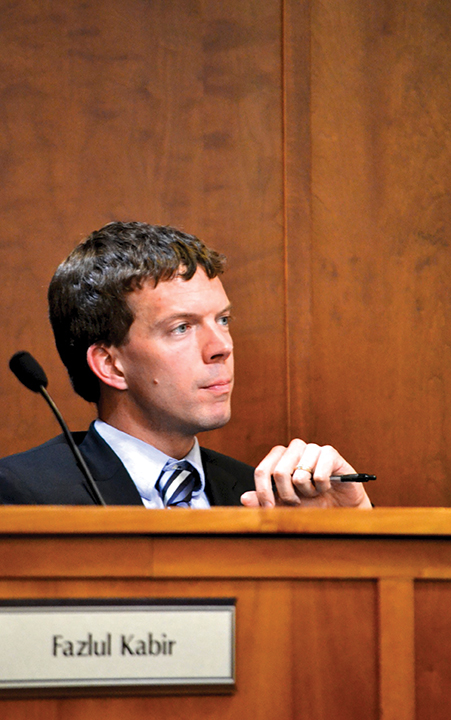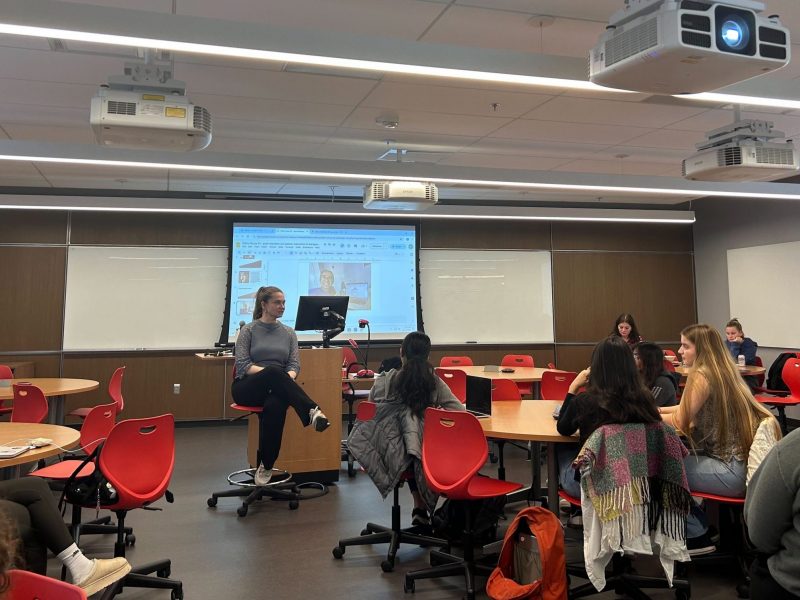
College Park Councilman Patrick Wojahn
For College Park residents and students, an end to the high tensions, bad behavior and bad reputations hanging over the city may be in sight.
After six months of hearings, meetings and contentious discussions, the 26-member College Park Neighborhood Stabilization and Quality of Life Workgroup released a final list of strategies they hope will provide the key to easing growing tensions between students and residents and improving the area’s reputation.
On April 30, the work group held a public forum and presented potential ideas to the city council, local residents and university students. The draft presented to the council was open to the public on the city’s website until Tuesday, and a final draft will serve as a starting point for the complex problems the city and university are preparing to address in the coming months.
The suggestions in the draft encompass the efforts of four separate sub-task forces that met over the course of the semester to develop solutions for specific areas of concern — issue reduction, homeownership, community building and housing diversity. They offered a mixture of long- and short-term projects for city officials, local landlords, university officials and students.
ISSUE REDUCTION
After contentious debate, the task force finalized a list of goals to heighten noise control enforcement, install city surveillance cameras, establish clear rental property regulations and offer more university-sponsored entertainment to keep student parties from getting out of control in the neighborhoods.
Arguments arose over the group’s recommendations on how to handle noise issues.
Some members of the work group thought fines and a larger code enforcement staff would help alleviate the issue of loud student parties, while others said the idea unfairly blamed students instead of calling for a collaborative effort.
“Increasing the fines isn’t going to change anything; it’s just going to agitate the people who are getting fined,” said Josh Ratner, Student Government Association city council liaison.
The greatest change in student behavior will come from the students themselves, Ratner said. Through cooperating with groups such as the Interfraternity Council, a group that governs this university’s fraternities, and with an expanded Code of Student Conduct, students would be more likely to hold themselves and their peers accountable, he said.
University officials seemed to be most receptive to those ideas, and some of the stakeholders have already begun implementing strategies proposed by the task force, District 1 Councilman Patrick Wojahn said.
The University Senate passed legislation Sunday to extend the Code of Student Conduct, which will enable the Office of Student Conduct to punish student misbehavior on and off the campus. Although the expansion was not linked to the work group’s suggestions, it shows the university’s priorities are in line with the city’s goals, said Stephanie Stullich, District 3 councilwoman.
Some campus student groups, such as the Residence Hall Association, have expressed reservations about the expansion, fearing the possibility of “double jeopardy” and university sanctions for minor offenses such as underage drinking. But university officials said the legislation will benefit students and residents by providing a safety net for assault victims and encouraging a positive residential environment.
“If there is misconduct off campus that directly impacts the university, we’re not going to push the problem farther and farther out of the city boundaries,” said Andrea Goodwin, student conduct director and task force member. “By and large, I think there’s a lot of sentiment around the table that we need to keep working towards these resolutions so we really can improve the quality of life in the city.”
COMMUNITY BUILDING
Tasked with brainstorming ideas to foster friendly relationships between students and their older neighbors, the community-building task force focused on encouraging student organizations to value city involvement.
The Greek life community received significant backlash in years past for throwing large house parties and failing to develop a respectful relationship with neighbors. As a result, the Interfraternity Council and the work group’s Greek life representative, Greg Waterworth, invested a significant amount of time in city affairs over the past semester, working with university officials to organize on-campus tailgating during football season and setting up an adopt-a-road program in Old Town College Park. At the forum, IFC members proposed requiring fraternities to include community-building work in the pledging process.
“I think that’s important for the city to see, as well as all the other members of the work group, that students are here at the table and we want to be involved,” said SGA President Samantha Zwerling.
Additionally, the SGA established a city committee in March to address off-campus issues in the upcoming school year.
With an organized structure of governance and regulations, the Greek organizations could be an effective way for students to self-regulate issues off the campus, Ratner said.
Some residents, such as Calvert Hills Civic Association President John Rigg, said they believe the relationship between students and residents off the campus appears straightforward — when this is simply not the case.
“The majority of people in the neighborhood recognize that we live in a college town,” Rigg said. “There are many opportunities to work collaboratively together as a community.”
HOUSING AND RENT STABILIZATION
Two separate task forces have addressed the issues of homeownership and housing diversity, as the city continues to push rent stabilization in the neighborhoods.
Members sought to address the complicated market for off-campus student housing, noting a need to enforce the appropriate city codes of rental properties. Over-occupancy has allowed more than five individuals to live in a rented home at a time, and although this lowers the monthly rate, it also becomes a safety hazard for renters, according to work group members.
The first draft of proposals calls for uniform language on leasing applications, forcing renters to abide by city codes. In recent years, homeowners have been inclined to rent their homes because of the potential profits, though the city hopes to attract long-term residents who will benefit the local economy. To increase home ownership, the task force proposed a campaign to market university amenities, the College Park Academy and the possibility of home ownership grants to potential residents.
MOVING FORWARD
The next step, according to Stullich, is the implementation of these ideas by the separate bodies involved.
“The ultimate proof of whether this process was effective will be if we see changes actually adopted and implemented and changing the patterns of behavior,” she said. “It sort of takes a while for all of this to come to pass, but at this point I think we have a really good set of strategies to work on.”



